|
|
|
Sort Order |
|
|
|
Items / Page
|
|
|
|
|
|
|
| Srl | Item |
| 1 |
ID:
176245
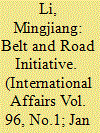

|
|
|
|
|
| Summary/Abstract |
The Belt and Road Initiative (BRI) has been regarded by international society as a major policy tool in China's geo-economic strategy. Under this policy platform, Beijing has pledged to invest billions of dollars in the infrastructure and industrial sectors across Eurasia and in the Indo-Pacific nations. It is widely believed that such huge amount of investment will inevitably generate significant geostrategic repercussions in these regions. In response to the BRI, the United States and other powers have come up with a ‘free and open Indo-Pacific’ strategy. This article attempts to address the following question: what impact is the BRI likely to have on the security ties between China and the other major players in the Indo-Pacific? The author finds that the BRI may significantly transform China's international security policy and the expansion of Beijing's security influence may further intensify the security competition between China and other major powers in the Indo-Pacific region. The article also proposes a new analytical angle for the study of geo-economics that unpacks the role of economic activities and processes in generating geopolitical intentions and catalysing geopolitical competition.
|
|
|
|
|
|
|
|
|
|
|
|
|
|
|
|
| 2 |
ID:
095873
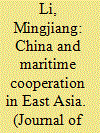

|
|
|
|
|
| Publication |
2010.
|
| Summary/Abstract |
Future international relations in East Asia are likely to be largely shaped by the maritime strategies and policies of various actors. This paper examines China's policy and behavior in maritime cooperation in the East Asian region in recent years, a topic that has been insufficiently understood. I suggest that while it is necessary and useful to take into account China's naval power, more attention to Chinese intentions and policy on East Asian maritime issues is warranted to arrive at a more balanced, and arguably more accurate, understanding of China's role in East Asian maritime affairs. This paper takes stock of China's changing perceptions, attitudes, and behaviors in maritime cooperation in the region. I describe China's new policy moves in the South China Sea and East China Sea. I also address some of the major Chinese concerns for further maritime cooperation in East Asia. I conclude that while a grand cooperative maritime regime is still not possible from a Chinese perspective, China is likely to agree to more extensive and substantive maritime cooperation in many functional areas, most notably in the non-traditional security arena.
|
|
|
|
|
|
|
|
|
|
|
|
|
|
|
|
| 3 |
ID:
152929
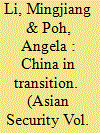

|
|
|
|
|
| Summary/Abstract |
Has China under Xi Jinping bid an official farewell to Deng Xiaoping’s “lying low” international strategy (taoguang yanghui) in pursuit of a more ambitious foreign policy agenda? In this article, we contend that Xi’s foreign policy is indeed beginning to show signs of departure from that of his predecessors. Beijing has displayed intentions to gradually create new rules in international politics and reform major international institutions to better suit Chinese interests. However, Chinese foreign policy in the first term of Xi’s administration has remained in a transitory phase. Continued domestic preoccupations, China’s lack of experience in undertaking more international responsibilities, as well as conflicting economic and security imperatives in China’s neighborhood have constrained the Chinese leadership’s ability to completely abandon its “lying low” international strategy.
|
|
|
|
|
|
|
|
|
|
|
|
|
|
|
|
| 4 |
ID:
091845
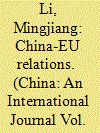

|
|
|
|
|
| Publication |
2009.
|
| Summary/Abstract |
China-EU relations, after more than a decade of steady growth since the mid-1990s, are becoming increasingly more fluid and unpredictable.Observers who had been optimistic are now starting to warn of an impending downward spiral in Sino-European ties.
|
|
|
|
|
|
|
|
|
|
|
|
|
|
|
|
| 5 |
ID:
165730
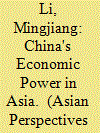

|
|
|
|
|
| Summary/Abstract |
China's growing economic power has been identified as a major factor in generating profound transformations in the strategic landscape in Asia. Beijing's interest in using its economic power for the pursuit of geopolitical objectives remains strong. Many analysts believe that the ambitious Belt and Road Initiative (BRI) represents the continuation and even intensification of that interest. I unpack the role of China's economic power in its external relations by focusing on how Guangxi, a subnational government in China, has facilitated the emergence of the BRI. My study suggests that in-depth knowledge about local governments' activism in socioeconomic engagements with neighboring countries contributes significantly to a more nuanced understanding of China's power, particularly its economic power in Asia.
|
|
|
|
|
|
|
|
|
|
|
|
|
|
|
|
| 6 |
ID:
101360
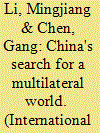

|
|
|
|
|
| Publication |
2010.
|
| Summary/Abstract |
While China will probably become more proactive in its multilateral diplomacy and increase its influence in global multilateral settings, various concerns and constraints make it unlikely that it will completely overhaul or even dramatically reshape the multilateral architecture at the global level. Stuck in defining its identity, China is caught up between posturing as a leader of the developing world on some policy issues and siding with the developed countries on others. China's involvement in global multilateralism is likely to be guided by pragmatism rather than grand visions.
|
|
|
|
|
|
|
|
|
|
|
|
|
|
|
|
| 7 |
ID:
183794
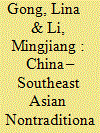

|
|
|
|
|
| Summary/Abstract |
This special issue seeks to provide a comprehensive and in-depth study on nontraditional security (NTS) issues in China–Southeast Asia relations, which has so far remained an understudied topic in Asian regional affairs. Through this specific angle, the project engages the debate on how China uses its expanding power resources to shape international and regional agendas, co-opt other countries, and induce cooperative behaviors. Specifically, it contributes to a better understanding of China's current interactions with the Association of Southeast Asian Nations (ASEAN) and its ten member states on NTS issues amid increasing salience of NTS threats and heightened tensions arising from traditional security challenges such as territorial disputes and great power rivalry. [End Page 1] While focusing on different NTS problems, the articles in this special issue converge on analyzing the factors that shape the processes and outcomes of NTS cooperation between China and Southeast Asia. This introduction sets the stage for discussion by providing a definition of NTS, an overview of China-ASEAN NTS cooperation, and the common research questions.
|
|
|
|
|
|
|
|
|
|
|
|
|
|
|
|
| 8 |
ID:
145882
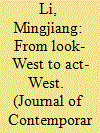

|
|
|
|
|
| Summary/Abstract |
China has been quite successful in developing its relations with Central Asian states and expanding its influence in the region since the 1990s. Most analysts contribute the success to the strategy and policy of China’s national central government. This observation certainly has a lot of truth, but at the same time we should not neglect or downplay the role that the local government in Xinjiang has played in cementing China–Central Asian ties. Xinjiang has functioned as an indispensable actor in China’s look-west and act-west policies towards Central Asia and beyond. With Chinese foreign policy elites increasingly interested in using the act-west policy as part of their counter-hedging strategy in Asia, Xinjiang appears to enjoy many more opportunities and play an even more significant role in China’s relations with countries in its western flank.
|
|
|
|
|
|
|
|
|
|
|
|
|
|
|
|
| 9 |
ID:
165727
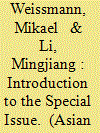

|
|
|
| 10 |
ID:
128274
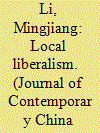

|
|
|
|
|
| Publication |
2014.
|
| Summary/Abstract |
One of the most interesting phenomena in contemporary international relations is the growing role of local government entities in forging and intensifying cross-border interactions in the social, economic and cultural arenas. Lamentably, this aspect of international relations, which I conceptualize as local liberalism, has not received sufficient scholarly attention. This paper attempts to fill in the gap by describing and analyzing how local liberalism has played a role in China's relations with Southeast Asia. The paper argues that local governments in Yunnan and Guangxi have played an important and positive role in cementing the relations between China and Southeast Asia. The paper suggests that debunking the China 'black box' to examine the different units in China, including the sub-national governments, may provide more useful insights for our understanding of China-Southeast Asian relations.
|
|
|
|
|
|
|
|
|
|
|
|
|
|
|
|
| 11 |
ID:
189331
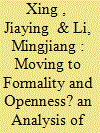

|
|
|
|
|
| Summary/Abstract |
For a long time, China has relied on an informal and covert approach to sanctions in its foreign relations. The past few years, however, have witnessed quite significant changes in Beijing's sanctions policy, as most notably seen in the promulgation of various new domestic regulations and laws as well as official announcements of tit-for-tat punitive measures against Western countries. Why did China so significantly change its sanctions policy? Has China's approach to sanctions moved from informality to formality and from covertness to overtness? And given China's growing zeal in protecting its overseas interests, what are the implications for China's foreign policy? This article attempts to address these questions by analyzing China's latest sanctions behavior. Our findings suggest that China's move was motivated by not only external challenges, particularly sanction pressures from the United States, but also by China's domestic political dynamics including the emphasis in Xi's thoughts on international competition. In reality, China's new sanctions policy and its broader application may be constrained by three factors: China's rhetorical traps, potential market uncertainties, and insufficient asymmetric leverages. It is likely that Beijing may pursue a two-tiered sanctions policy, an explicit countersanctions regime against the U.S. and its allies on one hand and an old-style informal sanctions policy towards other countries on the other hand.
|
|
|
|
|
|
|
|
|
|
|
|
|
|
|
|
| 12 |
ID:
107435
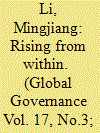

|
|
|
|
|
| Publication |
2011.
|
| Summary/Abstract |
What impact will the rise of China have on the existing international system? This article attempts to provide some clues for a better understanding of this issue by examining China's views on and policy toward international multilateralism in general and some of the newly emerging multilateral mechanisms in particular, including the Group of 20 and the BRICS. The article concludes that while China will become more proactive in its multilateral diplomacy, in many cases selectively, and increase its influence in global multilateral settings, various concerns and constraints will make it unlikely for China to completely overhaul or even dramatically reshape the multilateral architecture at the global level. China is likely to repeat its pattern of the past decade in East Asian regional multilateralism: participation, engagement, pushing for cooperation in areas that would serve Chinese interests, avoiding excessive responsibilities, blocking initiatives that would harm its in terests, and refraining from making grand proposals. In addition, China is stuck in defining its identity, and caught up between posturing as a leader of the developing world on some issues and siding with the developed countries on other policy issues. Given all of these constraints, China's involvement in global multilateralism is likely to be guided by pragmatism rather than grand visions. The article also argues that China will most likely strive to rise from within the existing international order. Washington should be prepared to plan its China policy on this basis and Sino-US relations will be shaped largely by the dynamics of contentions for power and interest as well as cooperation and coordination between China and the United States in various multilateral in stitutions.
|
|
|
|
|
|
|
|
|
|
|
|
|
|
|
|
|
|
|
|
|